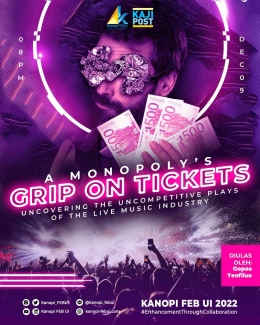November 18th marks as one of the most anticipated days in this year's entertainment industry: American singer-songwriter Taylor Swift has announced her first tour in over 4 years, situated in a time where the live music industry is recovering from a calamitous Covid-19 pandemic. As with most performing artists, Swift's management team partnered up with ticket sales and distribution company Ticketmaster to handle all operations of her ticket sales. The sale, however, turned out to be disastrous for both parties.
While 2.4 million tickets have been sold for Swift's "Eras Tour", widespread website delays, crashes and errors have infected the purchasing experience of millions of fans, causing a wide portion of them to queue online for hours, only for them to see a screen that tells the unavailability of their seats and tickets. The inefficiency, ineffectiveness and downright terrible service from Ticketmaster have scarred millions of fans with no ticket concerts, leading to massive censures and criticism of Ticketmaster in the mainstream media.
This Taylor Swift-Ticketmaster fiasco isn't the first -- and possibly not the last -- phenomenon that draws criticism to Ticketmaster and the operations behind the live music industry. In 1992, rock music band Pearl Jam had problems with Ticketmaster over the ticketing company's forced customary service fees and in 2002, jam band String Cheese was not allowed by Ticketmaster to sell tickets directly to fans. While these phenomena can be regarded as mere authoritative actions of Ticketmaster, it actually uncovers the dire consequences of letting a ticketing and live music company in acting as a monopoly in the entertainment industry.
The Monopoly of Concerts: The Aftermath of the Merger of Ticketmaster and Live Nation
Ticketmaster Entertainment, Inc. is widely known as the go-to ticketing service for live music. Operating as a subsidiary under Live Nation Entertainment, it is the world's largest ticketing service provider in the world, achieving revenues up to $11.9 billion in 2019 (Ticketing Business News, 2019) and employing up to 6,678 people. While its main source of revenue comes from charging service fees on ticket sales, managing venues and promoting artists, the ticketing company also earns income from concession sales, parking, rent, premium seating and ticket rebates. Its sheer size and capabilities is due to its notable history and its merger with another venue management company, Live Nation.
Despite its sheer size today, Ticketmaster started off humbly as a small software company that licensed ticketing systems to retail outlets and universities to sell physical tickets. Through "aggressive marketing" and incentives paid to venues for using Ticketmaster (Hayes, 2022), Ticketmaster grew to a significant size, overtaking Ticketron by the mid-1980s as it deals in more than 90 cities around the U.S.
This is done through a legion of tactics: 80% of Ticketmaster's stock had been acquired by Microsoft co-founder Paul Allen, transforming it from a simple ticketing company into an information technology company that can sell tickets online. Additionally, Ticketmaster -- along with competitor CitySearch -- was purchased through a majority stake by media giant InterActive Corp., resulting in a new entertainment service entity that not only sells concert tickets, but also related merchandise.
Ticketmaster's dominance can be marked right after Ticketmaster became its own entity in 2008, where it acquired premier artists management firm Front Line Management, leading itself into tight competition between Live Nation, which was the largest event promoter in the U.S during the 2000s. This competition was exacerbated by the fact that Live Nation was planning to release its own ticketing facility, potentially rivaling Ticketmaster. This rivalry ended up being short-lived as the two companies announced and completed a merger in 2010. The combined company would be called Live Nation Entertainment.
While Live Nation Entertainment hasn't been officially labeled as a monopoly, it strongly displays monopolistic traits. As a monopoly implies an "exclusive possession of a market by a supplier of a product for which there is no substitute" (Bain, 2021), it is justified to label Ticketmaster and its parent company, Live Nation Entertainment as de-facto monopolistic companies as they control over 70% of the ticketing market and 80% of operations of live concerts (Ederer, 2022). The presence of a monopolistic ticketing service has the potential to cause huge repercussions in the live music industry.
Impact of the Monopoly on the Live Music Industry After the Covid-19 Pandemic
While monopolies shouldn't always be labeled as "undesirable" entities, a huge portion of monopolies are known to practice anti-competitive behavior. Anti-competitive practices can be defined as "actions conducted to make it difficult or impossible for other companies to enter or succeed in their market" (Wigmore, 2019). Due to the absence of competitors, monopolistic firms usually don't have the incentive to continuously offer improved products or services that are sold at a desirable market price. In doing so, this results in lackluster service, higher fees, and lagging innovation.
The aforementioned Taylor Swift-Ticketmaster fiasco proves to be the consequence of a monopolistic firm practicing its anti-competitive behavior. As Ticketmaster has practiced price-fixing and "venue abuse" (where most large venues have been contracted to only be facilitated by Ticketmaster) that limit competition, it has displayed little need to improve its services as its ticketing platform repeatedly crashed and failed in guaranteeing "Eras Tour" tickets to millions of concertgoers (Santos, 2022).
This absence in providing optimal services and satisfaction to consumers can also be seen by Ticketmaster's resale market application, where scalpers -- who blocked genuine concert-goers in attending concerts -- are provided the platform to resell tickets at a higher price to these consumers. Essentially, Ticketmaster's dominance in the market have led them to conduct operations that are distasteful to consumers, such as its control of the resale market, where it still charges service fees for any tickets resold by private parties through its applications and websites (Hayes, 2022).
The presence of a monopolistic ticketing and live venue service can be detrimental to the state of the current live music industry and its performing artists. The Covid-19 pandemic that had ravaged the live music industry in the beginning of this decade has blocked the ability of performing artists to get the necessary income from touring (Ho, 2022). This impairment that exists in the live music industry doesn't only harm the entertainment industry, but also the economy in general.
Importance of Live Concerts and the Entertainment Industry to the Economy
According to the Tourism Consulting Team by Oxford Economics (2021), in the United States, the concerts and live entertainment industry generated direct business sales of $55.2 billion in 2019, indirect business sales of $34.7 billion in indirect business sales and $42.7 billion in induced business sale, cause a total economic impact of $132.6 billion. Furthermore, the live events industry generated a total fiscal impact of $17.5 billion in 2019, which also includes nearly $9.3 billion in federal tax revenues and $8.3 billion in state tax revenues.
Thus, the ticketing and music venue industry should be maintained fairly and competitively to make sure it doesn't harm the entertainment industry and to the economy, to an extent. An inefficient monopoly on the ticketing and music venues such as the likes of Ticketmaster can potentially decrease the generated sales of concerts and live entertainment industry, which also harms the economy as a whole.
End Game of the Live Music Industry
From this situation, it's best to break up the monopoly that Live Nation Entertainment has on the live music industry to ensure a competitive market where concert-goers can benefit more. This may be possible due to the recent investigations that have been picked up again after the Taylor Swift-Ticketmaster fiasco. In particular, Democratic senators Amy Klobuchar of Minnesota and Richard Blumenthal of Connecticut have called for a federal antitrust investigation of Live Nation Entertainment.
`In conclusion, the inefficient and nonoptimal service by Ticketmaster can be attributed to the ticketing company's lack of incentive to continuously improve its products in an anti-competitive environment. This inefficiency doesn't only harm performing artists and concert-goers, but also to the entertainment industry and to the economy in general.
By Gopas Teofilus Silalahi | Economics 2021 | Staff Divisi Kajian Kanopi 2022
Bibliography
Bain, J. (2019). monopoly and competition | Definition, Structures, Performance, & Facts. In Encyclopdia Britannica. https://www.britannica.com/topic/monopoly-economics
Berthold Seliger. (2018, November 29). Monopoly in the Worldwide Concert Business. Mdw-Magazin. https://www.mdw.ac.at/magazin/index.php/2018/11/29/monopoly-im-weltweiten-konzertgeschaeft/?lang=en
Ederer, F. (2022, November 23). Did Ticketmaster's Market Dominance Fuel the Chaos for Swifties? Yale Insights. https://insights.som.yale.edu/insights/did-ticketmasters-market-dominance-fuel-the-chaos-for-swifties
Gotting, M. (2022, April 7). Live music industry revenue worldwide 2023. Statista. https://www.statista.com/statistics/1096424/live-music-industry-revenue-worldwide/
Gtting, M. (2022, September 23). Leading music promoters worldwide 2019. Statista. https://www.statista.com/statistics/304982/leading-music-promoters-worldwide/
Hayes, A. (2022, December 3). Is Ticketmaster a Monopoly? Investopedia. https://www.investopedia.com/is-ticketmaster-a-monopoly-6834539
Ho, J. (2022, October 28). Live shows are back. But the economics behind them aren't great. Marketplace. https://www.marketplace.org/2022/10/28/live-shows-are-back-but-the-economics-behind-them-arent-great/
Papscun, D. (2022, November 19). Swifties Start Wave of Ticketmaster Monopoly Scrutiny. Bloomberg.com. https://www.bloomberg.com/news/articles/2022-11-18/bad-blood-swifties-start-wave-of-ticketmaster-monopoly-scrutiny?leadSource=uverify%20wall
Schwab, K. (2022, November 17). How Ticketmaster came to dominate live events (and incur the wrath of Taylor Swift fans). Marketplace. https://www.marketplace.org/2022/11/17/how-ticketmaster-came-to-dominate-live-events-and-incur-the-wrath-of-taylor-swift-fans/
Sutherland, P., Stohr, K., & Skoog, T. (2022, November 22). What Ticketmaster's Taylor Swift debacle reveals about the music industry's monopoly problem. Wbur. https://www.wbur.org/onpoint/2022/11/22/ticketmaster-taylor-swift-and-monopolies-in-the-music-business
The Economist. (2022, November 19). Is Ticketmaster a monopoly? The Economist. https://www.economist.com/the-economist-explains/2022/11/19/is-ticketmaster-a-monopoly
Tourism Consulting Team. (2021). The Concerts and Live Entertainment Industry: A Significant Economic Engine. In Oxford Economics. Oxford Economics. https://www.oxfordeconomics.com/resource/livemusic/
U.S. Department of Justice. (2015, June 25). The TicketMaster/Live Nation Merger Review And Consent Decree In Perspective. Www.justice.gov. https://www.justice.gov/atr/speech/ticketmasterlive-nation-merger-review-and-consent-decree-perspective
Vis, D. de. (2022, November 19). From Pearl Jam to Congress to Springsteen: Five of the biggest Ticketmaster dustups. The Hill. https://thehill.com/changing-america/enrichment/arts-culture/3742639-from-pearl-jam-to-congress-to-springsteen-five-of-the-biggest-ticketmaster-dustups/
Wigmore, I. (2019, April). What is anti-competitive practice? - Definition from WhatIs.com. WhatIs.com. https://www.techtarget.com/whatis/definition/anti-competitive-practice
Xie, T. (2019, September 24). Is Live Nation Entertainment's Monopoly Hurting Concert Lovers? Www.34st.com. https://www.34st.com/article/2019/09/live-nation-entertainment-ticketmaster-monopoly-concert-venue-tickets
Baca konten-konten menarik Kompasiana langsung dari smartphone kamu. Follow channel WhatsApp Kompasiana sekarang di sini: https://whatsapp.com/channel/0029VaYjYaL4Spk7WflFYJ2H







